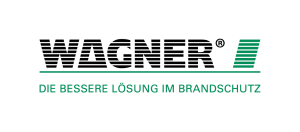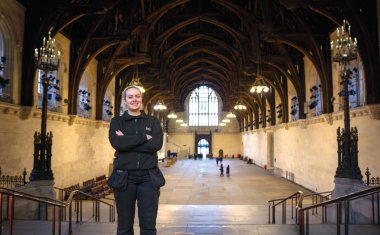Protect People, Safeguard Valuables
Minimum cause maximum effect: as lunchtime draws to an end, the employees of a production company leave the break room and return to their workstations. Meanwhile, in the kitchene...

Minimum cause – maximum effect: as lunchtime draws to an end, the employees of a production company leave the break room and return to their workstations. Meanwhile, in the kitchenette, a plastic chopping board on an accidentally left-on hob sets alight. Thanks to the fire detection system installed, the mishap is quickly resolved: the fire brigade arrives without delay and can quickly find and extinguish the fire.
If, however, there were no fire detection unit (FDU) in the scenario described, the fire would most probably only be detected once the flames had already started to rage uncontrollably. On arrival, the fire brigade’s first task would be to find the fire source – taking up valuable time during which the fire would continue to spread, increasing the amount of damage. The Wagner Group has the expertise to directly control extinguishing systems with its fire detection units. It is also certified by VdS Schadenverhütung GmbH, a wholly-owned subsidiary of the German Insurance Association (GDV). The VdS seal of approval has an excellent reputation in expert circles and among decision-makers.
An FDU is a central part of system-based fire protection. It receives incidents from several fire detectors, evaluates them and then responds to them. Its duties include detecting incipient fires as early as possible, notifying the body that will provide help (e.g. the fire brigade), warning people who are in the building, triggering fire protection devices as well as enabling the fire brigade to access the building and quickly locate the fire source. The decisive advantage of an FDU lies in the rapid automatic fire detection. Whereas fires in unoccupied, non-monitored buildings are often only discovered after several hours, the FDU detects fires at a very early stage. A comparison can be made with airbags, which have long been a standard feature in cars: they cannot prevent accidents, but they can effectively mitigate their consequences.
At the Heart
The fire panel (FDCP) forms the heart of the system. It evaluates the incoming detector signals and transmits the alarms and control commands in line with a predetermined program. In the event of an alarm, the FDCP also alerts the fire brigade and unlocks the fire brigade key depot. It can also be used to manage alarm devices (such as sirens, signal lamps or emergency exit controls), fire doors and hatches, smoke and heat vents, air conditioning units and lifts as well as automatic extinguishing systems. The FDCP also has a redundant power supply design comprising not only the onsite energy grid, but also an emergency power supply. The size of this is selected in accordance with to DIN VDE 0833-2.
FDUs are primarily installed in buildings subject to particularly high fire risks, such as airports, universities, company buildings, factories and hospitals. The obligation to install an FDU connected to the fire brigade is regulated under building law within the scope of special building regulations. When planning FDUs, the stipulations of DIN 14675 must always be observed. Systems required for insurance reasons must meet the requirements established by VdS 2095.
“The Wagner Group has decades of experience as a certified FDU installer and is therefore able to offer its customers tailor-made solutions”, says Markus Kock, Head of Systems Engineering Germany, Austria, Switzerland at Wagner. The systems that are used depend entirely on the individual requirements. Over the years, the company has already realized some extremely complex FDUs, for instance for hotels and airports.
The integration of air sampling smoke detectors enables sensitive, active fire detection with minimal risk of false alarms. “If desired, we will also integrate suitable systems for active fire prevention, fire extinguishing and risk management so as to provide all-round protection”, says Kock. After all, the company offers fire protection solutions from a single source – from air sampling smoke detectors to fire detector control panels and more.
Refitting for Future Requirements
As a company with a network of branch offices with their own sales, installation and service teams, the Wagner Group also regularly services and modernizes fire detection systems. Meeting both DIN 14675 and DIN VDE 08331, fire detection systems must be serviced by trained specialists on a quarterly basis. Checks are also made during these services as to whether the surrounding conditions have changed. When replacing an FDU, it is also advisable to choose a provider that is an international system manufacturer with its own R&D department – one that can offer everything from a single source, from design through project planning and setup to servicing, and that can modernize systems to make them suitable for the future. “The last point on that list is particularly important as the permanent effectiveness and operational reliability of fire detection systems is only ensured if systems are regularly inspected, maintained and serviced”, explains Kock.













